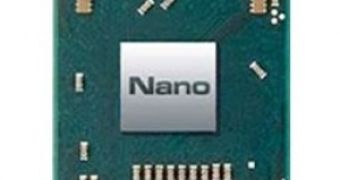The battle on the ULPC market seems to begin tightening up. We already know that Intel marked a big success with its Atom processor, yet responses to it appeared right away. That is the Nano chip from VIA, which turned to be quite a strong competitor. The other big player in the industry, Advanced micro Devices, also announced it would take part in the battle and that it readies two processors for the same segment.
Until AMD has its chips ready for launch, the main characters in the story remain Intel and VIA. As Atom made a name for itself, the giant chip manufacturer decided it’s high time to move forward with the release of a dual-core version of the product. News about it already emerged to the Web, and Atom 330 (Intel's new version) is expected to launch today, aiming at the nettop market.
VIA didn't let us wait too much for a response, and rumors say it also prepares a dual core version of the Nano microprocessor. The company has a lot to fight for, as even the smallest slice of market share is a step forward. A lot of work is also necessary, as the dual-core Atom 330 is stated to have under 10 watts thermal envelope, while Nano already goes much higher.
There is still good news for VIA, as it has design wins based on the microprocessor, with Hewlett-Packard inking some production and supply contracts. With HP joining the team, the chip maker has better chances to accelerate the development and production of the dual-core Nano. It seems that the CPU should be ready by the end of the year, and VIA plans to have it launched at next year's CES held in Las Vegas.
It remains to be seen whether the new processor will target the nettop segment of the market. There are good odds that it will come on HP's netbooks right upon release, some voices say. As for Intel's dual-core Atom, an N330 model is also rumored to come in the near future, but the company's roadmap doesn't point towards this move at the moment.

 14 DAY TRIAL //
14 DAY TRIAL //